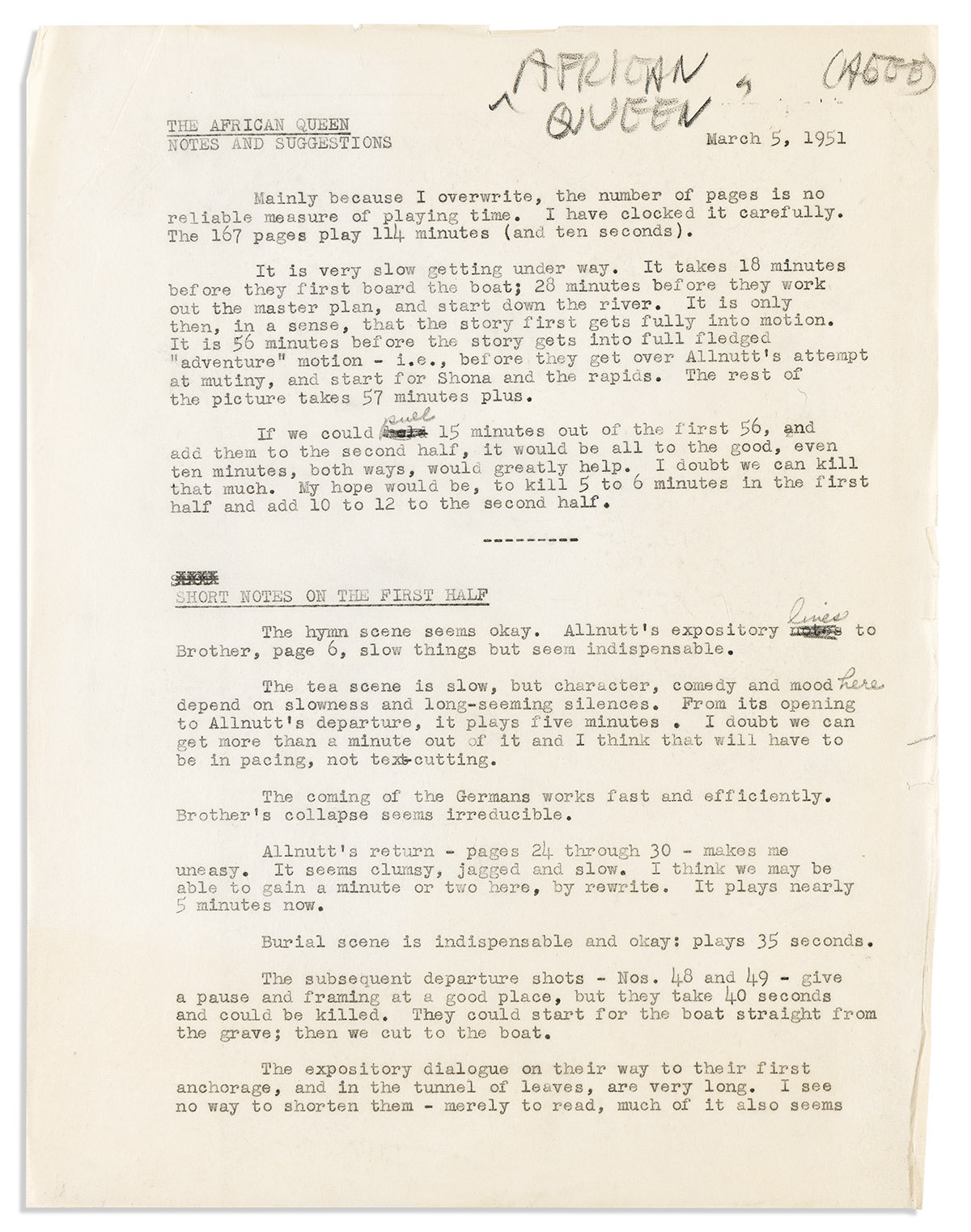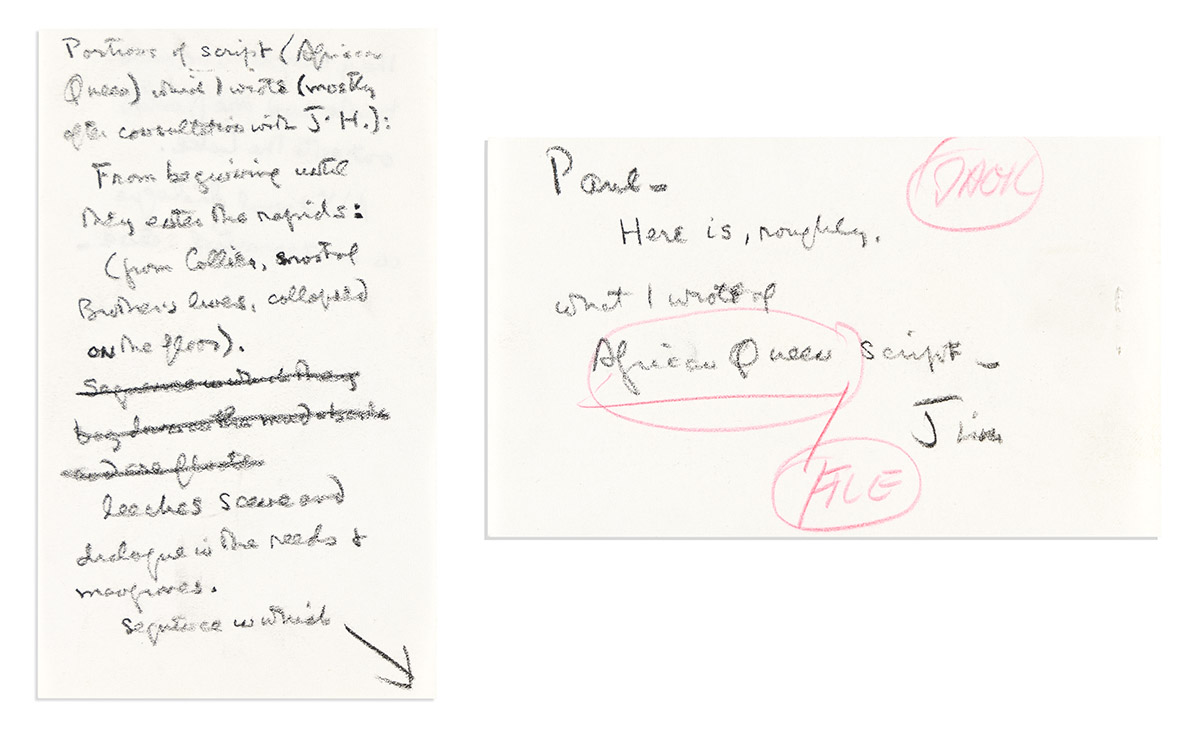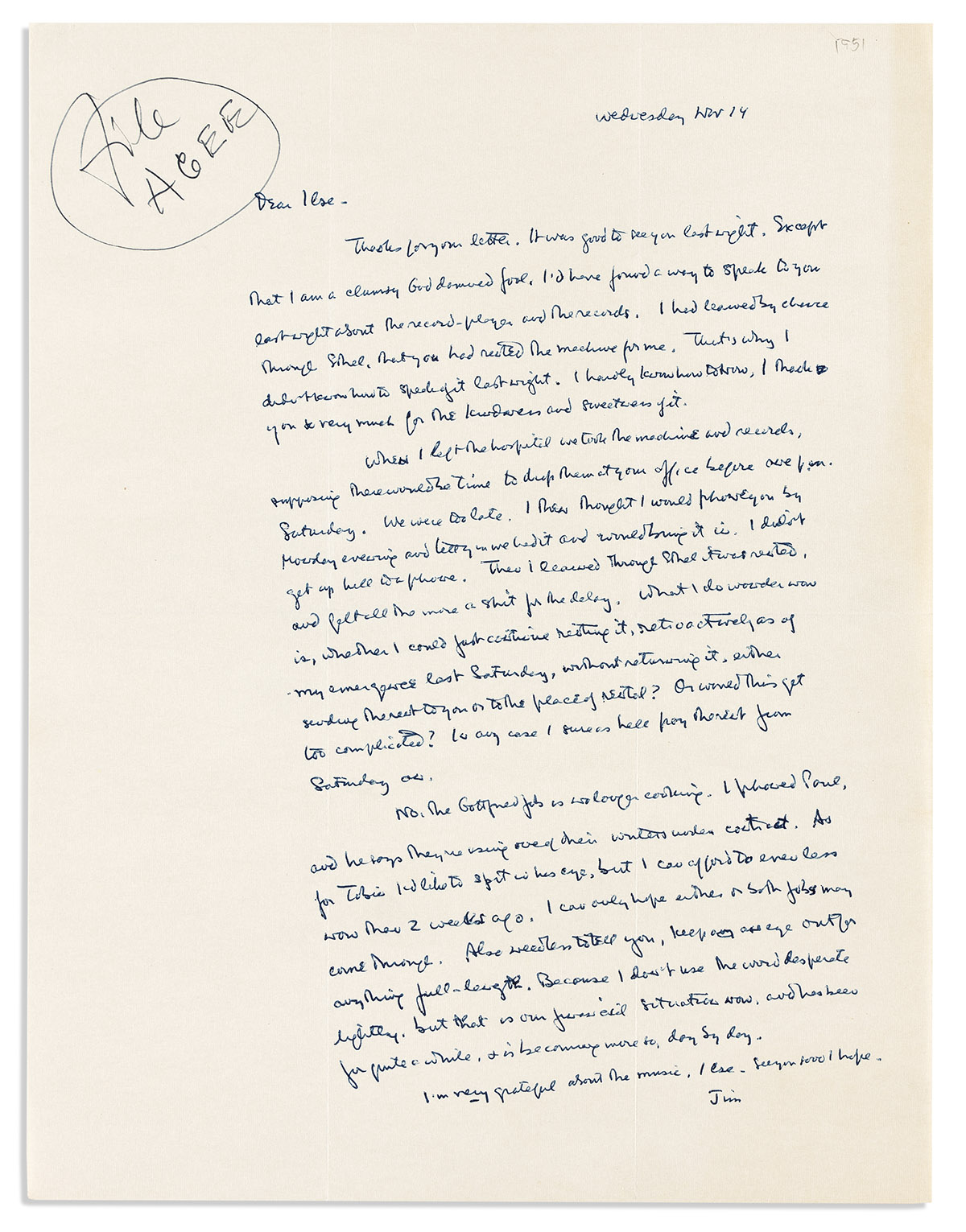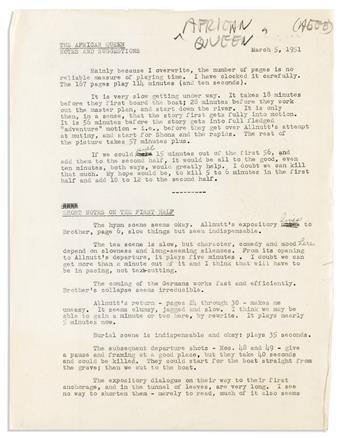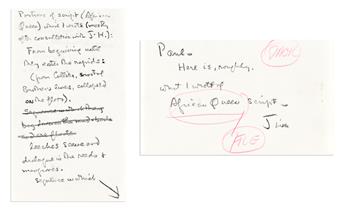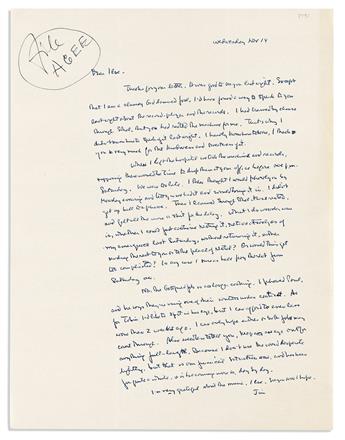Sale 2650 - Lot 93
Price Realized: $ 2,600
Price Realized: $ 3,250
?Final Price Realized includes Buyer’s Premium added to Hammer Price
Estimate: $ 3,500 - $ 5,000
ARCHIVE DOCUMENTING YEARS DURING AND AFTER MAKING OF "THE AFRICAN QUEEN" AGEE, JAMES. Archive of 10 letters or notes and a typescript, most Signed "Jim" or "Jim Agee", to story editor Ilse Lahn or agent Paul Kohner, relating to production of the 1951 film The African Queen or other film scripts, including 4 ALsS, 4 TLsS, and two ANsS. The typescript, unsigned but with three holograph corrections, in pencil, entitled "Notes and Suggestions," concerning his typed draft of the screenplay for The African Queen [not present], recommending scenes in the first half that can be made shorter and calculating the number of minutes that could be removed, discussing the intended impact of certain scenes in the second half that might be expanded with an estimate of the number of minutes, suggesting script changes to enhance continuity, listing proofreading corrections, comparing the belly-growling scene with a similar scene in Modern Times (1936), and discussing the dramatic possibilities in the use of torpedoes to destroy the Louisa. 19 pages. 4to, written on rectos of separate sheets of onionskin paper; "AFRCIAN QUEEN (AGEE)" written in unknown hand at upper edge of first page, some pages with holes punched in left edge, some scattered creasing. The notes, in pencil or ink, presenting the typescript described above with some explanatory remarks, or presenting typed draft of his letter to David Bradley dated April 7, 1953 (concerning terms for writing script for a proposed film project) written in upper margin of first page of the draft itself. Together 6 pages, 4to or 16mo, written mostly on rectos of separate sheets of onionskin or notepad paper; clerk's notes and markings written in red pencil or graphite on both notes. The letters, mostly to Ilse, complaining of his desperate financial situation, praising "John's picture" [The African Queen], discussing terms relating to a David Bradley film [Noa-Noa], describing recent work on a project for television and hoping to both write and direct another project, remarking that screenplay for Giant (1956) is set when Texas was less interesting than at present, expressing worries about legal and ethical implications of lack of rights to sources for Noa-Noa, considering writing screenplay for Moby Dick (1956), describing time spent with Salka [Viertel], considering work on various scripts ("The Lord's Anointed," "The Naked and the Dead," "Crime and Punishment," "The Heart of the Matter," etc.), and expressing concern about his own health. Together 12 pages, 4to, some on onionskin paper, most written on recto only; generally good condition. Np, 5 March 1951; Np, nd or 7 April 1953; Vp, 1951-53
Additional Details
Notes:
Nd: "Paul-- Here is, roughly, what I wrote of African Queen script. . . . Portions of script (African Queen) which I wrote (mostly after consultation with J[ohn] H[uston]): From beginning until they enter the rapids: (from [John] Collier, most of Brother's lines, collapsed on the floor). Leeches scene and dialogue in the reeds & mangroves. Sequence in which they bog down on mud . . . and are floated out onto the Lake. Additional dialogue in court-martial scene."
Letters:
14 November [1951]: ". . . No, the Godfrey job is no longer cooking. I phoned Paul, and he says they're using one of their writers under contract. As for Tobie, I'd like to spit in his eye, but I can afford to even less now than 2 weeks ago. I can only hope either or both jobs may come through. . . . Because I don't use the word desperate lightly, but that is our financial situation now, and has been for quite a while, & is becoming more so, day by day. . . ."
20 December 1952: ". . . And how do you like John's picture [John Huston's The African Queen]? I am absolutely dazzled by it. . . ."
[1952]: ". . . I recently spent a week in hospital, getting a thorough checkup; they worry more about my liver than my heart. I don't know whether this is good news or not.
"I certainly enjoyed acting, in Crane [adaptation of Stephen Crane's "The Bride Comes to Yellow Sky" in Face to Face (1952)?] and the Lincoln picture [episode of TV series Omnibus (1952)]; . . . was astonished by the favorable reviews. I'd like to do some more of this, so long as I don't start getting delusions of being a professional. . . ."
17 April 1953: ". . . The Killing Frost was set off today. Seems to me it should make a good picture and one I would enjoy working on.
"I'm not so enthusiastic about [Edna] Ferber's Giant, yet much of it should make a better picture than book. But most of the most promising picture material is as of 25 years ago--whereas on contemporary Texas, which seems far more interesting, she is comparatively skimpy."
15 August 1953: ". . . I wrote the script in the understanding that they already had rights on Gauguin's Noa-Noa . . . . Even if it were legally clear as a bell, and even if nobody ever so much as raised a squawk, I know that I did an adaptation, and that adaptation without rights and credits is plagiarism. I'm not a plagiarist, and I don't intend to come under even the faintest cloud, in that respect. It's a matter of elementary professional ethics to me, and I think should be to the makers of the film as well. But if they disagree, I must and will by whatever possible means, protect myself and my own principles. It seems to me it is up to them to secure these rights . . . and that if they won't, I must with-hold my script . . . .
". . . I will phone you or Paul and ask what the hell about Huston. Meanwhile I'd like to tell you that my personal predicament of effort-of-choice, between Moby Dick (if John likes the idea), [Manuel] Conde's film [Sarangani, never completed?], and my New York film, is extremely difficult. Manuel isn't the fly-by-night Paul thinks him, but a really talented if somewhat disconcerting professional; . . . As for the possible project with John [Moby Dick], we need say nothing: if he would like it, Lord knows it seems to me one of the things of a lifetime I'd best like to work on. . . ."
30 September 1953: ". . . When he finishes Giant, [George] Stevens would like to do The Naked & the Dead, me writing the script, money raised by Film Documents (The Quiet One & my New York Story) and/or U[nited] A[rtists]. And if I understood it right, as I may not have, Moby Dick is merely postponed, and will turn up again in about a year; or is Bradbury working on it? . . .
". . . I'm sorry to hear [Alexander] Korda feels tired of directing; I respect him much, and wish we could ever do The Heart of the Matter. Has [William] Wyler been thought of? He would seem close to ideal for it. . . ."
Nd: ". . . [F]or weeks now, I've expected to find the 4 or 5 days needed to incarcerate myself in a good hospital . . . . Every time it seemed to be coming, something new has turned up with the job. . . . [I]t has been nearly a year since I've seen a doctor . . . . Few serious heart or related pains: still, I am concerned. . . ."
With--Group of over 40 typed letters and 15 telegrams, mostly unsigned retained drafts, from Paul Kohner, Ilse Lahn, David Bradley, and others, mostly to Agee but some to each other, concerning proposed and current projects or the Agee estate after his death. 4to or oblong 8vo, mostly onionskin paper or Western Union telegram form. Vp, 1951-57.
In 1950, James Agee enthusiastically agreed to John Huston's request that he write the screenplay for The African Queen. After working through the summer on the project, Agee travelled to California that fall to meet with Huston, where they refined the script together. Because of the heart attacks he suffered in January of 1951, Agee was regretful in being unable to be on the set in Africa the following month, though he had largely completed the script by the time filming had begun.
Nd: "Paul-- Here is, roughly, what I wrote of African Queen script. . . . Portions of script (African Queen) which I wrote (mostly after consultation with J[ohn] H[uston]): From beginning until they enter the rapids: (from [John] Collier, most of Brother's lines, collapsed on the floor). Leeches scene and dialogue in the reeds & mangroves. Sequence in which they bog down on mud . . . and are floated out onto the Lake. Additional dialogue in court-martial scene."
Letters:
14 November [1951]: ". . . No, the Godfrey job is no longer cooking. I phoned Paul, and he says they're using one of their writers under contract. As for Tobie, I'd like to spit in his eye, but I can afford to even less now than 2 weeks ago. I can only hope either or both jobs may come through. . . . Because I don't use the word desperate lightly, but that is our financial situation now, and has been for quite a while, & is becoming more so, day by day. . . ."
20 December 1952: ". . . And how do you like John's picture [John Huston's The African Queen]? I am absolutely dazzled by it. . . ."
[1952]: ". . . I recently spent a week in hospital, getting a thorough checkup; they worry more about my liver than my heart. I don't know whether this is good news or not.
"I certainly enjoyed acting, in Crane [adaptation of Stephen Crane's "The Bride Comes to Yellow Sky" in Face to Face (1952)?] and the Lincoln picture [episode of TV series Omnibus (1952)]; . . . was astonished by the favorable reviews. I'd like to do some more of this, so long as I don't start getting delusions of being a professional. . . ."
17 April 1953: ". . . The Killing Frost was set off today. Seems to me it should make a good picture and one I would enjoy working on.
"I'm not so enthusiastic about [Edna] Ferber's Giant, yet much of it should make a better picture than book. But most of the most promising picture material is as of 25 years ago--whereas on contemporary Texas, which seems far more interesting, she is comparatively skimpy."
15 August 1953: ". . . I wrote the script in the understanding that they already had rights on Gauguin's Noa-Noa . . . . Even if it were legally clear as a bell, and even if nobody ever so much as raised a squawk, I know that I did an adaptation, and that adaptation without rights and credits is plagiarism. I'm not a plagiarist, and I don't intend to come under even the faintest cloud, in that respect. It's a matter of elementary professional ethics to me, and I think should be to the makers of the film as well. But if they disagree, I must and will by whatever possible means, protect myself and my own principles. It seems to me it is up to them to secure these rights . . . and that if they won't, I must with-hold my script . . . .
". . . I will phone you or Paul and ask what the hell about Huston. Meanwhile I'd like to tell you that my personal predicament of effort-of-choice, between Moby Dick (if John likes the idea), [Manuel] Conde's film [Sarangani, never completed?], and my New York film, is extremely difficult. Manuel isn't the fly-by-night Paul thinks him, but a really talented if somewhat disconcerting professional; . . . As for the possible project with John [Moby Dick], we need say nothing: if he would like it, Lord knows it seems to me one of the things of a lifetime I'd best like to work on. . . ."
30 September 1953: ". . . When he finishes Giant, [George] Stevens would like to do The Naked & the Dead, me writing the script, money raised by Film Documents (The Quiet One & my New York Story) and/or U[nited] A[rtists]. And if I understood it right, as I may not have, Moby Dick is merely postponed, and will turn up again in about a year; or is Bradbury working on it? . . .
". . . I'm sorry to hear [Alexander] Korda feels tired of directing; I respect him much, and wish we could ever do The Heart of the Matter. Has [William] Wyler been thought of? He would seem close to ideal for it. . . ."
Nd: ". . . [F]or weeks now, I've expected to find the 4 or 5 days needed to incarcerate myself in a good hospital . . . . Every time it seemed to be coming, something new has turned up with the job. . . . [I]t has been nearly a year since I've seen a doctor . . . . Few serious heart or related pains: still, I am concerned. . . ."
With--Group of over 40 typed letters and 15 telegrams, mostly unsigned retained drafts, from Paul Kohner, Ilse Lahn, David Bradley, and others, mostly to Agee but some to each other, concerning proposed and current projects or the Agee estate after his death. 4to or oblong 8vo, mostly onionskin paper or Western Union telegram form. Vp, 1951-57.
In 1950, James Agee enthusiastically agreed to John Huston's request that he write the screenplay for The African Queen. After working through the summer on the project, Agee travelled to California that fall to meet with Huston, where they refined the script together. Because of the heart attacks he suffered in January of 1951, Agee was regretful in being unable to be on the set in Africa the following month, though he had largely completed the script by the time filming had begun.
Exhibition Hours
Exhibition Hours
Aliquam vulputate ornare congue. Vestibulum maximus, libero in placerat faucibus, risus nisl molestie massa, ut maximus metus lectus vel lorem.



